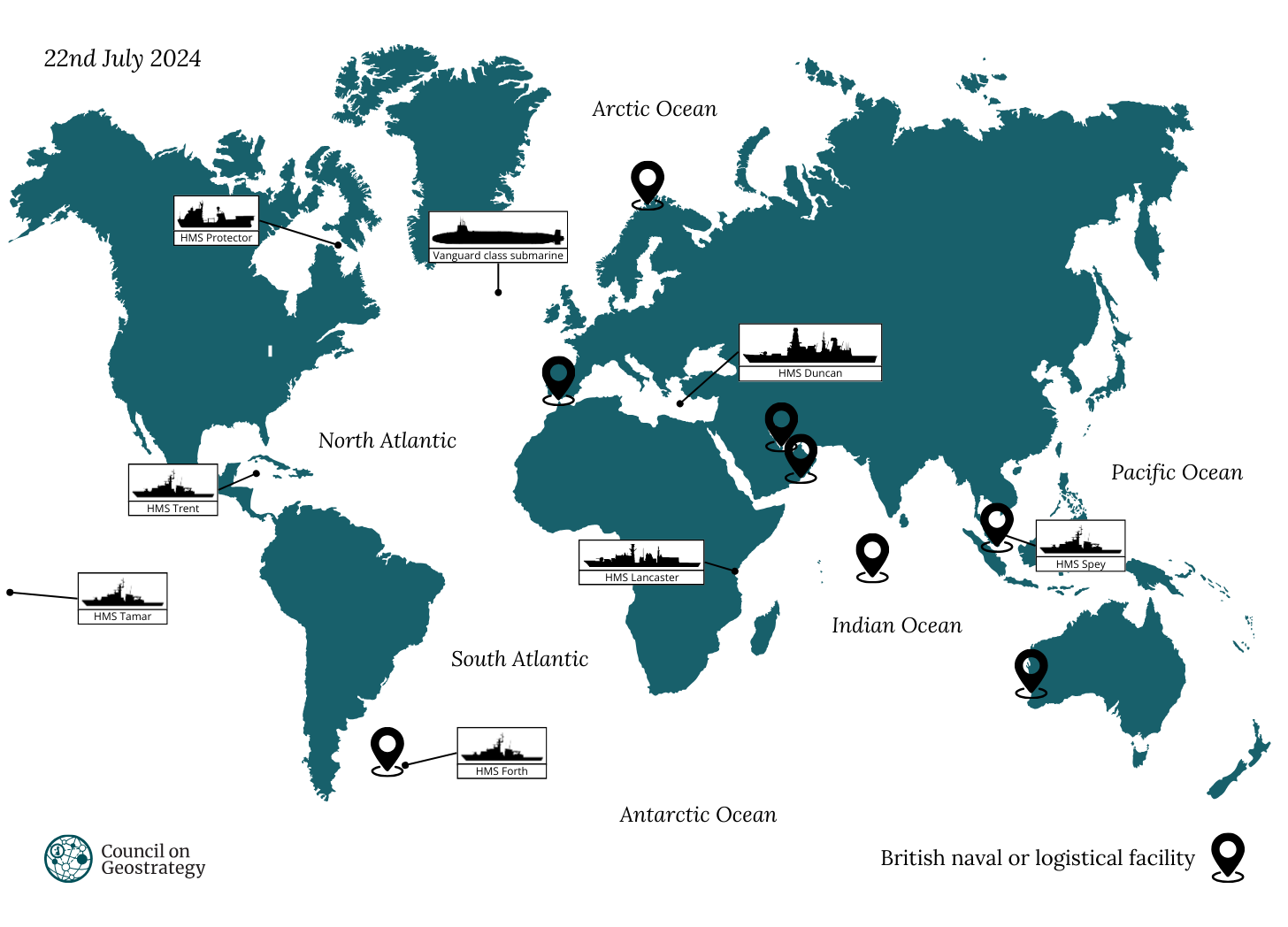Welcome to the third Cable, our weekly roundup of British foreign and defence policy.
The new parliamentary session has begun! On 17th July, His Majesty King Charles III laid out in the King’s Speech the new government’s policy agenda, including its key foreign and defence objectives. The speech stressed the United Kingdom’s (UK) ‘unshakable’ commitment to: the North Atlantic Treaty Organisation (NATO); the nuclear deterrent; and continued military aid to Ukraine – with Britain endeavouring to assist the Ukrainians with ‘a clear path to NATO membership.’ The King also stated the government’s intent to establish a new security pact with the European Union (EU) to confront the mutual threats Europeans face.
Of particular note in the King’s Speech, was the announcement that the new government will conduct a Strategic Defence Review (SDR), to ‘ensure that the UK’s defence capabilities are matched to the changing nature of global strategic threats.’ The government plans to publish the review during the first half of 2025 and will set out a road map to increase defence spending to 2.5% of Gross Domestic Product (GDP).
In response to launching the SDR, Sir Keir Starmer, Prime Minister, stated:
We will make sure our hollowed out armed forces are bolstered and respected, that defence spending is responsibly increased, and that our country has the capabilities needed to ensure the UK’s resilience for the long term.
John Healey, Defence Secretary, also commented:
...we need to be clear eyed about the threats we face, with the world becoming more volatile and technology changing the nature of warfare…our armed forces need to be better ready to fight. We need clearer accountability, faster delivery, less waste and better value for money.
Where the SDR will lead is unclear. What is clear is that the new government is prepared to embrace novel approaches: unlike previous reviews, an external group headed by Lord Robertson, former defence secretary and NATO Secretary General, will undertake the new SDR. After the announcement, Lord Robertson warned of a ‘deadly quartet’ comprising the People’s Republic of China (PRC), Russia, Iran and North Korea – signalling his recognition that the world is larger than Europe.
In other news, on 18th July, Britain hosted the fourth European Political Community (EPC) summit at Blenheim Palace, with leaders from 46 European countries attending. As part of the new government’s ‘reset’ with Europe, Starmer called for greater cooperation across Europe to counter the threat of Russia, maintain support for Ukraine, and tackle illegal migration and the criminal enterprises which benefit from it.
The prime minister also held meetings with the leaders of several key European countries, including France, Spain, Norway and Poland, which focused on forging closer ties and cooperating on enhancing European security. In a critical signal, Starmer invited Volodymyr Zelenskyy, President of Ukraine, to 10 Downing Street to explain to the Cabinet how Britain could enhance its assistance to his country. This makes him the first foreign leader since the 1990s to address the Cabinet.
How Britain is seen overseas
As the new Labour government settles in, think tanks, universities and governmental research services across the world continue to analyse this new era in British politics.
The United States Studies Centre in Canberra released a timely report assessing the benefits and challenges that Britain and Australia face in relation to the AUKUS partnership. The report explains how the UK may become AUKUS’ ‘most unambiguous beneficiary’ because it has secured the leading role in helping Australia to manufacture its new nuclear-propelled attack submarines.
The American Enterprise Institute published a short article assessing the implications of the British general and French legislative elections. It notes that ‘A country that has just left the bloc [the UK] is keen to do more on the continent, while the EU’s two central players – France and Germany – are increasingly paralysed and inward-looking.’
The ISEAS – Yusof Ishak Institute in Singapore released an article entitled ‘Does ASEAN Still Matter to the Labour Government in the United Kingdom?’. Concluding that it does, the article urges the new government to ‘avoid a narrowly focused approach to maintain its global status.’
How competitors frame Britain
In response to plans by the United States (US) to deploy long-range missiles in Europe, Russian state TV (reported by the Mirror) listed targets for Russian nuclear strikes across the continent. The UK was singled out as ‘our traditional enemy’, claiming that all it would take is three missiles to ‘collapse British civilisation’. A country rattling its nuclear sabre should not forget about the Royal Navy’s Vanguard class submarines.
Russia Today, reported that following the announcement of further British support to Kyiv, the Russian Embassy warned that this would only worsen the conflict in Ukraine. Russia seems to believe if can deflect from the fact that it alone invaded Ukraine!
In a rebuke of Lord Robertson’s ‘deadly quartet’ remark, the Global Times published an article stating that inciting crises and disasters is an excuse for NATO's survival, and a typical ploy by the West to shift internal conflicts and crises onto others. What, then, must the PRC’s antics in the South China Sea say about China?
Tracking the Royal Navy’s global deployments
As always, a Vanguard class submarine of the Royal Navy was on active patrol in the North Atlantic during the third week of July 2024, protecting the nation’s vital interests. HMS Queen Elizabeth, the flagship of the fleet, left Rosyth dockyard having completed repairs. HMS Richmond returned to Portsmouth on 18th July having undertaken patrols in North Atlantic waters, while HMS Protector entered the Hudson Strait on 19th. HMS Duncan remained in the Mediterranean protecting a US Navy carrier strike group.
In other parts of the world, HMS Lancaster arrived in Mombasa having steamed south from the Gulf. Offshore patrol vessels HMS Forth, HMS Trent, HMS Spey and HMS Tamar were busy as ever. HMS Forth remains around the Falkland Islands, HMS Trent arrived in the Cayman Islands to assist with the clean-up after Hurricane Beryl, HMS Spey left Kuantan in Malaysia, while HMS Tamar made a port call in Tuvalu.
How Britain thinks about foreign affairs
The new British government is launching a foresight project on the future of global supply chains. It aims to understand the challenges facing global supply chains and how such chains can be made more resilient. While this project is the first of its kind, it builds on previous UK government policy papers and strategies on supply chains.
The Integrated Review Refresh, for example, set out the UK’s intention to protect capabilities, supply chains and technologies of strategic importance to Britain, as well as its allies and partners. The UK’s Critical Minerals Strategy, which built on evidence from the Council on Geostrategy, looked to accelerate growth of British domestic capabilities, collaborate with international partners, and enhance international markets to make them more responsive, transparent and responsible. The Advanced Manufacturing Plan noted the UK’s intention to build supply chain resilience by pursuing and agreeing partnerships with key allies and partners such as the US and Japan, as well as boosting Britain’s domestic capabilities and strengths. Supply chain resilience has also been a key part of the UK’s Semiconductor Strategy, Food Strategy, and Battery Strategy.
Implications
At NATO’s 75th anniversary summit, alliance leaders addressed topics including supply chain resilience. One particular area of concern has been the threat to critical raw materials that NATO members need for their armed forces, defence industries, and wider economies. Minerals such as cobalt, silicon, lithium, and rare earth elements are the central for applications including renewable energy, telecommunications, infrastructure, and defence equipment.
Recent events have shown how vulnerable supply chains are to disruptions. The British government’s new cross-government foresight project will use scientific evidence to explore future trends and potential shocks, and then stress test different supply chains against these scenarios. Doing so will help the government identify weaknesses and opportunities for improvement, leading to a more secure and reliable system for critical imports. A report with the project's findings is expected in 2025.
If you found this Cable useful, please subscribe or pledge your support!
What do you think about this Cable? Why not leave a comment below?







